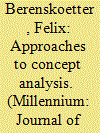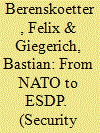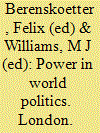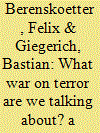|
|
|
Sort Order |
|
|
|
Items / Page
|
|
|
|
|
|
|
| Srl | Item |
| 1 |
ID:
152104


|
|
|
|
|
| Summary/Abstract |
This article takes as its point of departure Stefano Guzzini’s recent call for ‘ontological theorizing’ as a reflexive engagement with central concepts. In an attempt to advance this agenda, the article presents an accessible overview of different approaches to concept analysis to stake out the field for a discussion of what ontological theorising might entail. The article advances the notion of concepts as ‘basic’ and lays out the parameters through which they obtain meaning, followed by a discussion of three approaches, which tackle the multifaceted nature of basic concepts within and across different contexts. These approaches are labelled ‘historical’, ‘scientific’ and ‘political(critical)’ and presented through the work of Reinhart Koselleck, Giovanni Sartori and Michel Foucault, respectively. The article notes that concept analysis, as discussed here, stands in tension with modern forms of theory building yet is a creative source for theorising that accepts the unstable, political and context-bound nature of ontology.
|
|
|
|
|
|
|
|
|
|
|
|
|
|
|
|
| 2 |
ID:
098786


|
|
|
|
|
| Publication |
2010.
|
| Summary/Abstract |
This article addresses the question why Germany invested in what became the European Union's Security and Defense Policy (ESDP), a potential competitor to NATO. In addition to highlighting Germany's role in the development of ESDP, the paper offers a social constructivist explanation for this investment based on the concepts of friendship, estrangement, and emancipation. It develops the argument that (1) states gain ontological security by investing in international institutions to negotiate and pursue ideas of order with friends; (2) deep and enduring dissonance between friends signifies a process of estrangement and poses a threat to ontological security; and (3) if states cannot restore resonance with the old friend-institution configuration, they choose a strategy of emancipation by investing in an alternative. Applied to an analysis of German strategic adjustments between 1990 and 2009 in the context of U.S.-led interventions in Iraq, the Balkans, and Afghanistan, the article suggests that Germany invested in ESDP to offset enduring dissonance with the United States and NATO about appropriate mandate, missions, and means, with France and ESDP emerging as a suitable alternative. With this, the article offers valuable insights into the parameters guiding German security policy and the structure of transatlantic relations and also provides a theoretical alternative to the realist balancing proposition.
|
|
|
|
|
|
|
|
|
|
|
|
|
|
|
|
| 3 |
ID:
080183


|
|
|
|
|
| Publication |
London, Routledge, 2007.
|
| Description |
x, 316p.
|
| Standard Number |
9780415421133
|
|
|
|
|
|
|
|
|
|
|
|
Copies: C:1/I:0,R:0,Q:0
Circulation
| Accession# | Call# | Current Location | Status | Policy | Location |
| 053008 | 327.112/BER 053008 | Main | On Shelf | General | |
|
|
|
|
| 4 |
ID:
106926


|
|
|
|
|
| Publication |
2011.
|
| Summary/Abstract |
This article argues that constructivists committed to reflexivity should be students of the future. It notes that both conventional and critical approaches do not sufficiently engage with the problem of future uncertainty in the process of identity formation and neglect its behavioural implications. Against this backdrop, the article regrounds constructivism in a temporal ontology and the argument that humans, in the face of contingency, seek to establish visions of a meaningful future. It discusses how visions, as utopias and/or dystopias, define possibilities of being and thereby provide actors with a sense of direction, and it differentiates between "robust" and "creative" visions to highlight two ways in which such possibilities are manifested. In doing so, the article encourages constructivists to become more attentive in identifying the visions which enable and bind creative agents in the process of realization.
|
|
|
|
|
|
|
|
|
|
|
|
|
|
|
|
| 5 |
ID:
070966


|
|
|
|
|
| Publication |
2006.
|
| Summary/Abstract |
This article critically assesses Alistair Shepherd's conclusion that ESDP is of limited utility in the post-9/11 world. We argue that this view is flawed for three reasons: first, Shepherd's analysis rests on an American-centric interpretation of the 'war on terror', neglecting the fact that the European perspective of the current security environment, and how to deal with it, is quite different from the American one. Second, we contend that Shepherd neglects ESDP's development as a tool for both military and civilian crisis management, which leads him to, third, underestimate a variety of activities of the EU and member states aimed at addressing threats of terrorism and WMD proliferation. Building on this criticism, it is suggested that the issue of ESDP's 'relevance' should not, indeed cannot be measured by assessing its usefulness for an American-defined war on terror. Rather than asking what the EU can do for the US, we propose that the more substantial question is how the EU is equipped to address the threats of terrorism and WMD proliferation as they appear to Europeans.
|
|
|
|
|
|
|
|
|
|
|
|
|
|
|
|
|
|
|
|
|